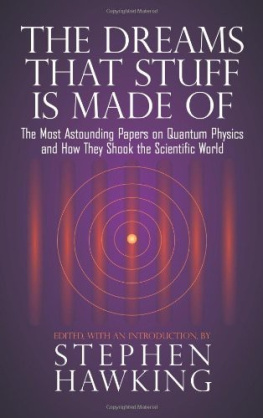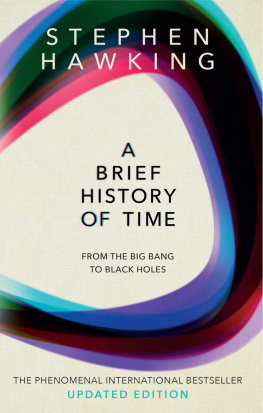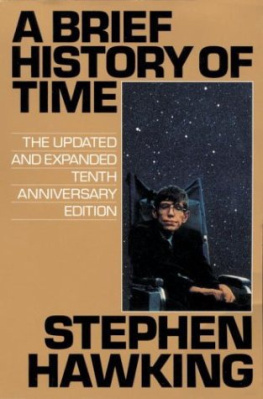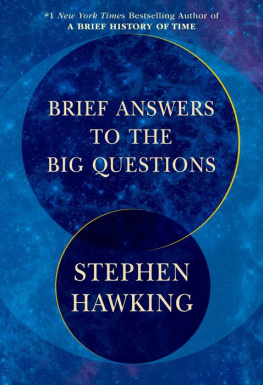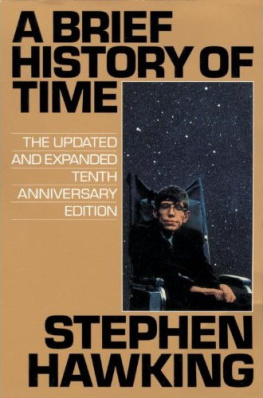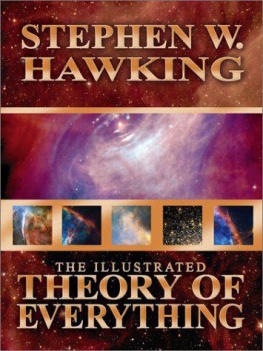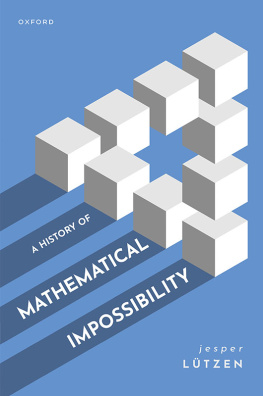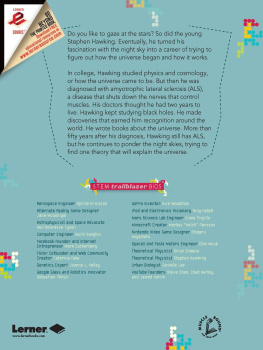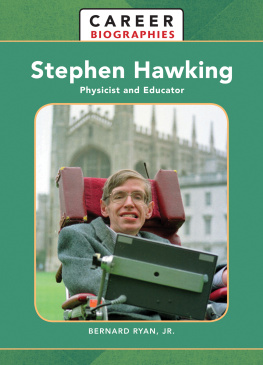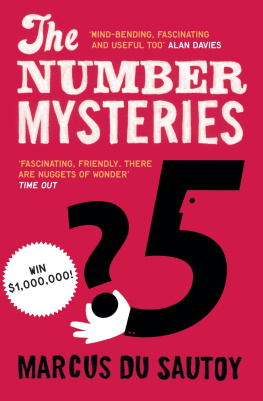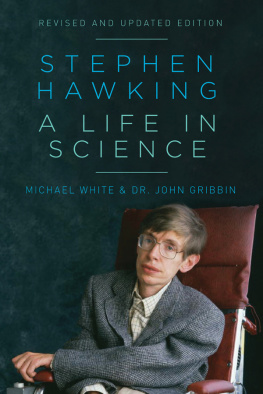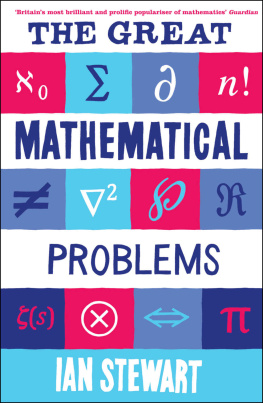GOD CREATED
THE INTEGERS
2007 by Stephen Hawking
All rights reserved under the Pan-American
and International Copyright Conventions
This book may not be reproduced in whole or in part, in any form or by any means, electronic or mechanical, including photocopying, recording, or by any information storage and retrieval system now known or hereafter invented, without written permission from the publisher.
987654321
Digit on the right indicates the number of this printing
Library of Congress Control Number: 2007920542
ISBN-13978-0-7624-3272-1
Cover design by Bill Jones
Interior design by Bill Jones and Aptara Inc.
Typography: Adobe Garamond
This book may be ordered by mail from the publisher.
Please include $2.50 for postage and handling.
But try your bookstore first!
Running Press Book Publishers
2300 Chestnut Street
Philadelphia, Pennsylvania 19103-4317
Visit us on the web!
www.runningpress.com
A NOTE ON THE TEXTS
The texts in this book are based on translations of the original, printed editions. We have made no attempt to modernize the authors own distinct usage, spelling or punctuation, or to make the texts consistent with each other in this regard.
The Editors
TEXT AND PICTURE CREDITS
Text Permissions:
Selections from Euclids Elements, by Thomas L. Heath, courtesy of Dover Publications.
Selections from The Works of Archimedes, by Thomas L. Heath, courtesy of Dover Publications.
Selections from Diophantus of Alexandria, A Study in the History of Greek Algebra, by Thomas L. Heath, reprinted with permission of Cambridge University Press.
The Geometry of Rene Descartes, trans. David E. Smith and Marcia L. Latham courtesy of Dover Publications.
Selections from Isaac Newtons Principia, notes by David Eugene Smith, courtesy of New York: Daniel Adee, 1848.
English translation of Leonhard Eulers On the sums of series of reciprocals (De summis serierum reciprocarum) courtesy of Jordan Bell.
Leonhard Eulers The Seven Bridges of Konigsberg and Proof that Every Integer is A Sum of Four Squares courtesy of Dover Publications.
Pierre Simon Laplaces A Philosophical Essay on Probabilities, introductory note by E.T. Bell, courtesy of Dover Publications.
Selection from Jean Baptiste Joseph Fouriers The Analytical Theory of Heat courtesy of Dover Publications.
Selections from Carl Friedrich Gausss Disquisitiones Arithmeticae courtesy of Yale University Press.
Selections from Oeuvres compltes dAugustin Cauchy reprinted from 1882 version published by Gauthier-Villars, Paris.
Nikolai Ivanovich Lobachevskys Geometrical Researches on the Theory of Parallels, trans. Dr. George Bruce Halstead, courtesy of Dover Publications.
Jnos Bolyais The Science of Absolute Space, trans. Dr. George Bruce Halstead, courtesy of Dover Publications.
English translation of Evariste Galois On the conditions that an equation be soluble by radicals and Of the primitive equations which are soluble by radicals, courtesy of John Anders.
Evariste Galois On Groups and Equations and Abelian Integrals, courtesy of Dover publications.
George Booles An Investigation of the Laws of Thought courtesy of Dover Publications.
Georg Friedrich Bernhard Riemanns Ueber die Darstellbarkeit einer Function durch einer trigonometrische Reihe, Ueber die Anzahl der Primzahlen unter einer gegebenen Grsse, and Ueber die Hypothesen welche der Geometrie zu Grunde liegen, courtesy of Dover Publications.
Karl Weierstrass Ausgewhlte Kapitel aus der Funktionenlehre: Vorlesung gehalten in Berlin 1886, mit der akademischen Antrittsrede, Berlin 1857, und drei weiteren Originalarbeiten... aus den Jahren 1870 bis 1880/86 / K. Weierstrass; herausgegeben, kommentiert und mit einem Anhang versehen von R. Siegmund-Schultze reprinted from R. Siegmund-Schultze (Ed.), Teubner, Leipzig, 1886 (Springer, Berlin), 1998.
Richard Dedekinds Essays on the Theory of Numbers, trans. Wooster W. Beman, courtesy of Dover Publications.
Selections from Georg Cantors Contributions to the Founding of the Theory of Transfinite Numbers, trans. Philip E.B. Jourdain, courtesy of Dover Publications.
Selections from Henri Lebesgues Integrale, Longeur, Aire reprinted from Annali di Matematica, Pura ed Applicata, 1902, Ser. 3, vol. 7, pp. 231359.
Kurt Gdels On Formally Undecidable Propositions of Principia Mathematica and Related Systems, trans. B. Meltzer, courtesy of Dover Publications.
Alan Turings On computable numbers with an application to the Entscheidungsproblem, Proceedings of the London Mathematical Society courtesy of the London Mathematical Society.
Picture Credits:
Euclid: Getty Images.
Archimedes: Getty Images.
Diophantus: Title page of Diophanti Alexandrini Arthimeticorum libri sex...., 1621: Library of Congress, call number QA31.D5, Rare Book/Special Collections Reading Room, (Jefferson LJ239).
Rene Descartes: Getty Images.
Isaac Newton: Time Life Pictures/Getty Images.
Leonhard Euler: Getty Images.
Pierre Simon de Laplace: Getty Images.
Jean Baptiste Joseph Fourier: Science and Society Picture Library, London.
Carl Friedrich Gauss: Getty Images.
Augustin-Louis Cauchy: Bettmann/CORBIS.
variste Galois: Bettmann/CORBIS.
George Boole: CORBIS.
Georg Friedrich Bernhard Riemann: Bettmann/CORBIS.
Karl Weierstrass: Bettmann/CORBIS.
Richard Dedekind: Frontispiece from Richard Dedekind Gesammelte mathematische Werke. Reprint by Chelsea Publishing Company, Bronx, NY, 1969, of the edition published in Brunswick by F. Vieweg, 193032. Reprinted by permission of the Chelsea Publishing Company. Photograph provided by the Library of Congress, call number QA3.D42.
Georg Cantor: CORBIS.
Henri Lebesgue: Frontispiece from Henri Lebesgue Oeuvres Scientifiques, volume I. Reproduced by permission of LEnseignement Mathmatique, Universite De Geneve, Switzerland. Photograph provided by the Library of Congress, call number QA3.L27, vol. 1, copy 1.
Kurt Gdel: Time Life Pictures/Getty Images.
Alan Turing: Photo provided by Kings College Archive Centre, Cambridge, UK, AMT/K/7/9. Contact the Archive Centre for copyright information.
CONTENTS

WE ARE LUCKY TO LIVE IN AN AGE LN WHICH WE ARE STILL MAKING DISCOVERIES. IT IS LIKE THE DISCOVERY OF AMERICA-YOU ONLY DISCOVER IT ONCE. THE AGE IN WHICH WE LIVE IS THE AGE IN WHICH WE ARE DISCOVERING THE FUNDAMENTAL LAWS OF NATURE...
AMERICAN PHYSICIST RICHARD FEYNMAN, SPOKEN IN 1964
S howcasing excerpts from thirty-one of the most important works in the history of mathematics (four of which have been translated into English for the very first time), this book is a celebration of the mathematicians who helped move us forward in our understanding of the world and who paved the way for our current age of science and technology.
Over the centuries, the efforts of these mathematicians have helped the human race to achieve great insight into nature, such as the realization that the earth is round, that the same force that causes an apple to fall here on earth is also responsible for the motions of the heavenly bodies, that space is finite and not eternal, that time and space are intertwined and warped by matter and energy, and that the future can only be determined probabilistically. Such revolutions in the way we perceive the world have always gone hand in hand with revolutions in mathematical thought. Isaac Newton could never have formulated his laws without the analytic geometry of Ren Descartes and Newtons own invention of calculus. It is hard to imagine the development of either electrodynamics or quantum theory without the methods of Jean Baptiste Joseph Fourier or the work on calculus and the theory of complex functions pioneered by Carl Friedrich Gauss and Augustin-Louis Cauchyand it was Henri Lebesgues work on the theory of measure that enabled John von Neumann to formulate the rigorous understanding of quantum theory that we have today. Albert Einstein could not have completed his general theory of relativity had it not been for the geometric ideas of Bernhard Riemann. And practically all of modern science would be far less potent (if it existed at all) without the concepts of probability and statistics pioneered by Pierre Simon Laplace.


